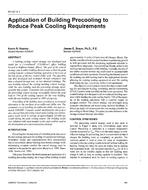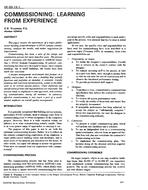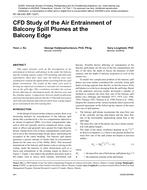An off-the-shelf, two-ton window air conditioner with an energy efficiency ratio (EER) of 10 was modified for liquid overfeeding (LOF) operation by adding a recuperative accumulator-heat exchanger (AHX) and an additional 15% of R22 charge (Mei and Chen 1993). No original component was replaced. The unit was tested in an environmental chamber with outdoor chamber temperatures varying from 82degF to 110degF and the indoor chamber temperature at 80degF. The relative humidity was 52%. The unit was first tested without the LOF feature (baseline test) and then tested with LOF. Both air-side and refrigerant-side measurements were collected. It was found that air-side and refrigerant-side cooling capacities, for most tests, were within 50% of each other. The test results showed that 82degF ambient, the LOF cooling capacity and coefficient of performance (COP), compared with baseline test data, improved by about 14% and 10%, respectively. At 95degF ambient, the LOF’s cooling capacity and COP are about 12% and 7.5% higher than that of the baseline test. For ambient temperature below 100degF, LOF operation will have both higher sensible and latent cooling capacities. The only additional cost is for the AHX and for a rerouting of liquid and suction lines. For units that have accumulators in the system design, the added cost may be minimal.
KEYWORDS: year 1996, experiment, heat exchangers, accumulators, unit air conditioners, windows, R22, testing, relative humidity, measuring, cooling, thermal capacity, coefficient of performance, ambient temperature
Citation: ASHRAE Trans. 1996, vol.102, part 1, paper number 3938, 63-66, 10 figs., 3 refs.
Product Details
- Published:
- 1996
- File Size:
- 1 file , 430 KB
- Product Code(s):
- D-16514


